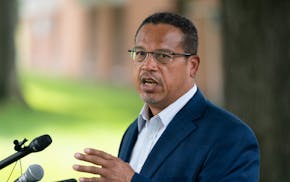A one-time janitor at a Minneapolis mosque was found guilty Thursday of conspiring to help a terrorist group recruit young Minnesota men for a holy war in their native Somalia.
A federal jury in Minneapolis deliberated about 8 1/2 hours before convicting Mahamud Said Omar, 46, in a case that provided the clearest picture to date of a worldwide investigation into the recruiting of at least 20 young men to fight in Somalia with Al-Shabab, a U.S.-designated terror group.
Omar, of Minneapolis, rocked gently in his seat and studied the jurors dispassionately as the verdict was read.
Guilty on count one: conspiracy to provide material support to terrorists. Guilty on count two: providing material support to terrorists. Guilty on count three: conspiracy to provide material support to a foreign terrorist organization, namely, the Islamist group Al-Shabab. Guilty on count four: providing material support to Al-Shabab.
Each of those charges carries a sentence of up to 15 years in prison. Omar swallowed hard in advance of the last verdict, which carries a maximum penalty of life in prison: guilty of conspiring to kill or maim people.
The reading of the verdict took just five minutes. Omar, dressed in a black sports coat and blue pinstriped shirt, shook it off quickly. As deputies led him from the courtroom, he turned to his family members, smiled broadly and raised both hands over his head, as if declaring victory.
"We're going to go lick our wounds," said Jon Hopeman, one of Omar's three attorneys. He said Omar would appeal.
The government withheld considerable information it had developed under Foreign Intelligence Surveillance Act wiretaps, "so we're going to look at that," Hopeman said.
The importance of the trial was underscored by the presence of the U.S. attorney for Minnesota, B. Todd Jones, and many of his top prosecutors, investigators and other federal employees who wedged hip to shoulder in the gallery.
"Obviously, we're very pleased about the verdict," Jones said outside of the U.S. District Court building.
'Eyes of the world' on case
For several years, Jones said, many in the Twin Cities have been curious to know about "Operation Rhino," the government's investigation into a pipeline of more than 20 men who were recruited to go fight for Al-Shabab in Somalia. He said the "eyes of the world" were focused on the trial, which allowed the government to showcase the vast amount of work done by the FBI and the Minnesota Joint Terrorism Task Force.
"It is absolutely what we were hoping for," said E.K. Wilson, an FBI supervisory special agent in Minneapolis who was involved in the investigation. "We're glad that this case was able to play out in the federal court system and we firmly believe it is a very significant milestone in the progress of the overall Operation Rhino."
"We're in essence very relieved that all of this information is out there," Jones said.
The United States values religious freedom, he said, "but there are some lines that you just cannot cross. One of those lines is, you cannot provide material support to a designated terrorist organization like Al-Shabab, and if you choose to do that, there are going to be some serious consequences."
Omar's family members declined to comment, referring questions to community activist Omar Jamal. "They were not expecting this," he said. "They are a little bit shocked."
Jamal said the trial revealed many things that were not known to the community about Al-Shabab's recruiting efforts in Minnesota, but he said many questions remain.
"The most important thing is, this is not the end of the game," Jamal said. "The people responsible for ruining the lives of these kids are still out there ... somewhere."
On that, he and government prosecutors agreed.
"Some folks are still fugitives ... and there are still ongoing investigations," Jones said. "This isn't the end."
Assistant U.S. Attorney John Docherty, the ever-serious lead prosecutor, declined to comment on testimony that came out in the trial about some Minnesota women who sent money to Somalia so the Minnesota men could buy guns. That would get into an ongoing investigation, he said.
Docherty said he hopes the publicity about the trial will help bring an end to the Al-Shabab pipeline.
Ralph Boelter, former head of the Minneapolis FBI office who was involved in the case as it first emerged, said it was a thorough investigation. "The U.S. attorneys did their part, presented their case very effectively. It's gratifying but it's not surprising at the same time."
One mother: 'I'm happy'
Abayte Ahmed, whose 19-year-old son left to fight with Al-Shabab and was killed in Somalia, said she was pleased by the verdict. "I'm happy," she said. She praised the FBI for its hard work. She testified for the government about how her son, Jamal Aweys Sheikh Bana, disappeared one morning never to return. Since that day, she has been living in pain, she said. "I'm not feeling well, for years now. I'm not strong. He was my first son. He was a very smart boy. I don't know this man [who] brainwashed my son."
Abdirizak Bihi, whose teenage nephew was among the Minneapolis recruits and is believed to have died in Somalia, also praised the verdict. "I feel great," he said. "I can sleep a full sleep tonight for the first time in four years."
The trial began Oct. 1 and ended after 10 days of testimony from government witnesses who included three former Al-Shabab recruits and another supporter who pleaded guilty in the case and cooperated with the government in hopes of lighter sentences. Family members of some of the Minnesota recruits also testified, including the sister of the first known American suicide bomber, Shirwa Ahmed, of Minneapolis.
"I don't think that there is another case in the country you can point to where four cooperating witnesses in a terror investigation have testified," said W. Anders Folk, the former lead prosecutor in the case who now is a shareholder with Leonard Street and Deinard in Minneapolis.
Prosecutors said Omar made travel arrangements and supplied cash to some of the men who joined Al-Shabab.
"I think the fact that there is now somebody who's been convicted who's not just a foot soldier, but who's also a recruiter and a financier, should indicate that Al-Shabab's actions in Somalia have clearly impacted folks in the United States," Folk said.
"They're looking for foot soldiers. They're looking for financiers. They're looking for facilitators. And I think that's what Mahamoud Said Omar was, a kind of facilitator," he said. "I think the verdict really reflects that juries are going to hold people accountable for whatever kind of role folks in the United States decide to play on behalf of Al-Shabab."
The jury of eight women and four men saw two Al-Shabab propaganda videos. One showed some of the Minnesota men at a training camp learning to use AK-47 assault rifles, belt-fed machine guns and rocket-propelled grenades. The other showed an ambush on Ethiopian troops who had been asked by the Transitional National Government to help stabilize the country after more than two decades of civil war.
But perhaps the most damning evidence in the case came from Omar himself, as reported by an FBI agent who interviewed him in jail in the Netherlands, and in conversations captured in wiretap recordings with some of the Al-Shabab recruits.
'A ton of information'
Docherty said the most difficult part of the case was distilling down the "amazing amount of hard work" by the FBI and the terrorism task force to something that could be presented to the jury. "There was literally a ton of information," he said.
Docherty said he and three other prosecutors -- William Narus, of the Department of Justice, and Assistant U.S. Attorneys Charles Kovats Jr. and LeeAnn Bell -- assembled the evidence one piece at a time and then connected the dots.
It clearly worked. Jurors asked during their deliberations Thursday if they could see a chart prosecutors had prepared showing Omar's phone contacts with four Minnesota men sequenced against their travel records to Somalia. The charts showed that Omar's contacts spiked after Shirwa Ahmed of Minneapolis blew himself up in one of five coordinated bombings on Oct. 29, 2008, and continued through the men's departures over the next several days. Chief U.S. District Judge Michael Davis denied the motion because the chart had not been admitted as evidence, and told the jurors to rely on their memory.
Omar's defense team did not call any witnesses. They argued that he was a simple, part-time janitor at the Abubakar As-Saddique Islamic Center in Minneapolis when the alleged conspiracy took off in 2007 and got caught up in the case by accident.
Dan Browning • 612-673-4493 Allie Shah • 612-673-4488

Ellison sues real estate broker over alleged loan schemes
Developer vows to push forward on Lino Lakes mosque project even if city tries to stop it

Doors Open Minneapolis gives free tours of more than 100 buildings

